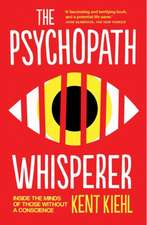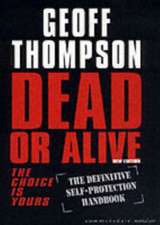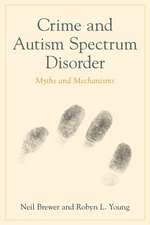The Politics of Antisocial Behaviour: Amoral Panics: Routledge Advances in Criminology
Autor Stuart Waitonen Limba Engleză Paperback – 9 iun 2009
| Toate formatele și edițiile | Preț | Express |
|---|---|---|
| Paperback (1) | 430.43 lei 43-57 zile | |
| Taylor & Francis – 9 iun 2009 | 430.43 lei 43-57 zile | |
| Hardback (1) | 1055.51 lei 43-57 zile | |
| Taylor & Francis – 19 noi 2007 | 1055.51 lei 43-57 zile |
Din seria Routledge Advances in Criminology
-
 Preț: 311.41 lei
Preț: 311.41 lei -
 Preț: 288.73 lei
Preț: 288.73 lei -
 Preț: 310.37 lei
Preț: 310.37 lei - 20%
 Preț: 278.00 lei
Preț: 278.00 lei -
 Preț: 440.00 lei
Preț: 440.00 lei -
 Preț: 348.00 lei
Preț: 348.00 lei -
 Preț: 445.22 lei
Preț: 445.22 lei -
 Preț: 387.99 lei
Preț: 387.99 lei -
 Preț: 369.73 lei
Preț: 369.73 lei -
 Preț: 383.89 lei
Preț: 383.89 lei - 18%
 Preț: 998.71 lei
Preț: 998.71 lei -
 Preț: 434.07 lei
Preț: 434.07 lei - 18%
 Preț: 1053.92 lei
Preț: 1053.92 lei -
 Preț: 433.86 lei
Preț: 433.86 lei -
 Preț: 422.59 lei
Preț: 422.59 lei -
 Preț: 388.13 lei
Preț: 388.13 lei -
 Preț: 385.08 lei
Preț: 385.08 lei -
 Preț: 436.14 lei
Preț: 436.14 lei -
 Preț: 369.73 lei
Preț: 369.73 lei - 18%
 Preț: 999.51 lei
Preț: 999.51 lei -
 Preț: 491.60 lei
Preț: 491.60 lei - 25%
 Preț: 766.49 lei
Preț: 766.49 lei -
 Preț: 433.05 lei
Preț: 433.05 lei - 18%
 Preț: 895.78 lei
Preț: 895.78 lei - 18%
 Preț: 1120.20 lei
Preț: 1120.20 lei - 18%
 Preț: 729.55 lei
Preț: 729.55 lei - 18%
 Preț: 1054.71 lei
Preț: 1054.71 lei - 15%
 Preț: 463.82 lei
Preț: 463.82 lei -
 Preț: 415.67 lei
Preț: 415.67 lei
Preț: 430.43 lei
Nou
Puncte Express: 646
Preț estimativ în valută:
82.36€ • 86.21$ • 68.55£
82.36€ • 86.21$ • 68.55£
Carte tipărită la comandă
Livrare economică 31 martie-14 aprilie
Preluare comenzi: 021 569.72.76
Specificații
ISBN-13: 9780415872720
ISBN-10: 0415872723
Pagini: 214
Ilustrații: 2 b/w images and 1 table
Dimensiuni: 152 x 229 x 12 mm
Greutate: 0.32 kg
Ediția:1
Editura: Taylor & Francis
Colecția Routledge
Seria Routledge Advances in Criminology
Locul publicării:Oxford, United Kingdom
ISBN-10: 0415872723
Pagini: 214
Ilustrații: 2 b/w images and 1 table
Dimensiuni: 152 x 229 x 12 mm
Greutate: 0.32 kg
Ediția:1
Editura: Taylor & Francis
Colecția Routledge
Seria Routledge Advances in Criminology
Locul publicării:Oxford, United Kingdom
Cuprins
1. Introduction 2. Safety: The New ‘Absolute’ 3. The Politics of Vulnerability 4. Diminished Subjectivity 5. From Moral to Amoral Panics 6. A Social Society. Afterword
Recenzii
"Waiton’s book warns us about what can happen when policy makers panic. This agenda setting text provides great insight into the politics of fear."
–Professor Frank Furedi
"In Amoral Panics, Stuart Waiton offers an insightful interpretation of why contemporary fears focus on issues of safety and victimization. His analysis of British concerns with antisocial behavior can help us understand all manner of modern anxieties."
– Joel Best, author of Damned Lies and Statistics and Flavor of the Month: Why Smart People Fall for Fads
"This book by a leading figure in US/UK sociology, drawing on recent research, gives a fascinating account."
- Francis Bennion, Your Voice
"Waiton has produced a thought-provoking and challenging book; that takes recent criminological debates (such as those around social control, actuarial justice, risk and fear of crime) and resituates them within a wider sociological thesis about the decline of coherent political culture."
- Majid Yar, University of Hull, Crime, Media, Culture
"This is a book packed with sharp and original insights that marks out a significant new line of enquiry for theories of criminal law and criminal justice."
- Peter Ramsay, London School of Economics, Criminology and Criminal Justice
"This work should be widely read. It is an acute analysis that effectively challenges common explanations for what are assumed to be social problems."
- Harris Chaiklin, University of Maryland, The Journal of Nervous and Mental Disease
–Professor Frank Furedi
"In Amoral Panics, Stuart Waiton offers an insightful interpretation of why contemporary fears focus on issues of safety and victimization. His analysis of British concerns with antisocial behavior can help us understand all manner of modern anxieties."
– Joel Best, author of Damned Lies and Statistics and Flavor of the Month: Why Smart People Fall for Fads
"This book by a leading figure in US/UK sociology, drawing on recent research, gives a fascinating account."
- Francis Bennion, Your Voice
"Waiton has produced a thought-provoking and challenging book; that takes recent criminological debates (such as those around social control, actuarial justice, risk and fear of crime) and resituates them within a wider sociological thesis about the decline of coherent political culture."
- Majid Yar, University of Hull, Crime, Media, Culture
"This is a book packed with sharp and original insights that marks out a significant new line of enquiry for theories of criminal law and criminal justice."
- Peter Ramsay, London School of Economics, Criminology and Criminal Justice
"This work should be widely read. It is an acute analysis that effectively challenges common explanations for what are assumed to be social problems."
- Harris Chaiklin, University of Maryland, The Journal of Nervous and Mental Disease
Notă biografică
Stuart Waiton lectures at the University of Abertay Dundee, Scotland, is a Director of the youth research group Generation Youth Issues, and is a contributor to the Times Education Supplement. He is author of Scared of the Kids? Curfews, crime and the regulation of young people.
Descriere
By providing a new criminological framework for understanding the fear of crime, The Politics of Antisocial Behaviour re-poses the increasingly important debate around antisocial behaviour and the internationally understood idea of moral panics.












